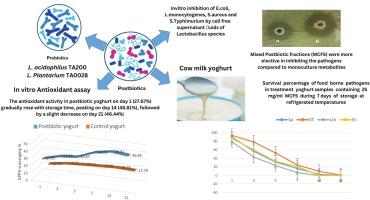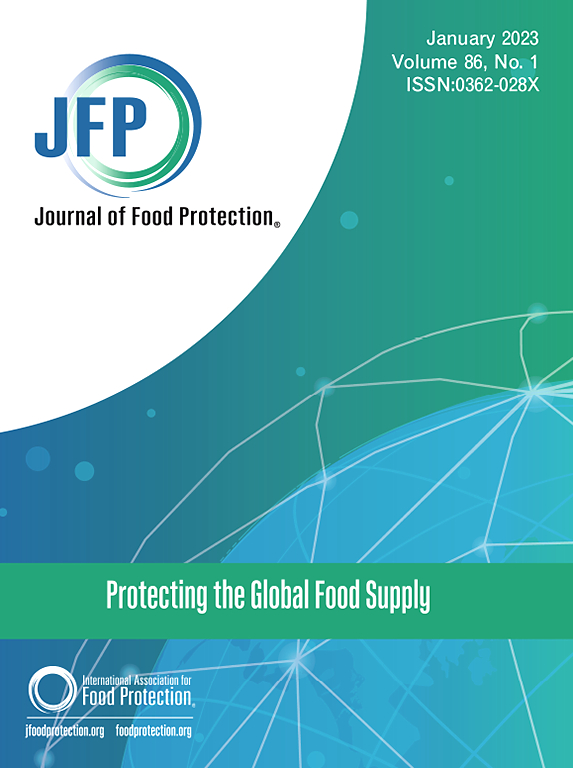Investigating the Antibacterial, Antioxidant, and Cholesterol-lowering Properties of Yogurt Fortified with Postbiotic of Lactobacillus acidophilus and Lactiplantibacillus plantarum in the Wistar Rat Model
IF 2.8
4区 农林科学
Q3 BIOTECHNOLOGY & APPLIED MICROBIOLOGY
引用次数: 0
Abstract
Postbiotics have gained attention in the food industry due to their functional properties and ease of use compared to their live parent cells. Postbiotics are the metabolic byproducts of probiotic microorganisms, offering advantages such as antimicrobial and anti-diabetic effects. The study aimed to explore the potential antibacterial, antioxidant, and cholesterol-lowering effects of postbiotics from Lactobacillus acidophilus (LA) and Lactiplantibacillus plantarum (LbP) through in vitro and in vivo studies. Freeze-dried postbiotics from L. acidophilus BLAC 258 and L. plantarum were used in yogurt to inhibit foodborne pathogens over a 21-day storage period at 4 °C. The cholesterol-lowering effects of the postbiotic yogurt were assessed in Wistar rats fed with Normal Basal Diet (NBD) and High Cholesterol Diet (HCD). All experiments were performed in triplicate, and the collected data were analyzed with a one-way ANOVA using SPSS v.20 (2021) software. The Tukey Honestly Significant Difference (HSD) test was used for means differences at the 95% confidence interval. The results showed that postbiotic-fortified yogurt exhibited significant antioxidant and antibacterial effects. The antioxidant capacity of the yogurt increasingly peaked at 48.81% on day 14. Also, Listeria monocytogenes counts in the postbiotic yogurt decreased by approximately 2 Log10 on day 3. High-cholesterol-fed rats receiving postbiotic yogurt experienced significant reductions in total cholesterol, triglycerides, and LDL levels. Overall results indicate that postbiotics functional yogurt might be a safe and effective strategy for managing cholesterol levels and inhibiting foodborne pathogens.

在 Wistar 大鼠模型中研究添加了嗜酸乳杆菌和植物乳杆菌益生元的酸奶的抗菌、抗氧化和降胆固醇特性
与活的母细胞相比,后益生菌具有功能特性且易于使用,因此在食品工业中备受关注。后益生菌是益生微生物的代谢副产物,具有抗菌和抗糖尿病等优点。本研究旨在通过体外和体内研究,探索嗜酸乳杆菌(LA)和植物乳杆菌(LbP)益生菌的潜在抗菌、抗氧化和降低胆固醇作用。嗜酸乳杆菌 BLAC 258 和植物乳杆菌冻干益生菌被用于酸奶中,在 4 °C 下储存 21 天后可抑制食源性病原体。用正常基础膳食(NBD)和高胆固醇膳食(HCD)喂养的 Wistar 大鼠评估了酸奶后益生菌降低胆固醇的作用。所有实验均一式三份,收集的数据使用 SPSS v.20 (2021) 软件进行单因素方差分析。对 95% 置信区间的均值差异采用 Tukey 诚实显著差异(HSD)检验。结果表明,后益生菌强化酸奶具有显著的抗氧化和抗菌效果。酸奶的抗氧化能力在第 14 天达到峰值 48.81%。此外,后益生菌酸奶中的李斯特菌数量在第 3 天减少了约 2 Log10。接受益生菌后酸奶的高胆固醇喂养大鼠的总胆固醇、甘油三酯和低密度脂蛋白水平显著降低。总体结果表明,后益生菌功能酸奶可能是控制胆固醇水平和抑制食源性病原体的一种安全有效的策略。
本文章由计算机程序翻译,如有差异,请以英文原文为准。
求助全文
约1分钟内获得全文
求助全文
来源期刊

Journal of food protection
工程技术-生物工程与应用微生物
CiteScore
4.20
自引率
5.00%
发文量
296
审稿时长
2.5 months
期刊介绍:
The Journal of Food Protection® (JFP) is an international, monthly scientific journal in the English language published by the International Association for Food Protection (IAFP). JFP publishes research and review articles on all aspects of food protection and safety. Major emphases of JFP are placed on studies dealing with:
Tracking, detecting (including traditional, molecular, and real-time), inactivating, and controlling food-related hazards, including microorganisms (including antibiotic resistance), microbial (mycotoxins, seafood toxins) and non-microbial toxins (heavy metals, pesticides, veterinary drug residues, migrants from food packaging, and processing contaminants), allergens and pests (insects, rodents) in human food, pet food and animal feed throughout the food chain;
Microbiological food quality and traditional/novel methods to assay microbiological food quality;
Prevention of food-related hazards and food spoilage through food preservatives and thermal/non-thermal processes, including process validation;
Food fermentations and food-related probiotics;
Safe food handling practices during pre-harvest, harvest, post-harvest, distribution and consumption, including food safety education for retailers, foodservice, and consumers;
Risk assessments for food-related hazards;
Economic impact of food-related hazards, foodborne illness, food loss, food spoilage, and adulterated foods;
Food fraud, food authentication, food defense, and foodborne disease outbreak investigations.
 求助内容:
求助内容: 应助结果提醒方式:
应助结果提醒方式:


